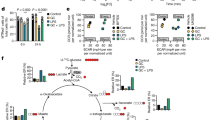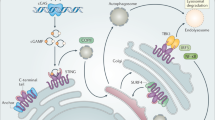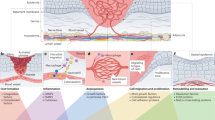Abstract
Most inflammatory agents activate nuclear transcription factor-κB (NF-κB) which results in expression of genes for cytokines, adhesion molecules, and enzymes involved in amplification and perpetuation of inflammation. Emodin (3-methyl-1,6,8-trihydroxyanthraquinone) is an active component from the roots of Polygonum cuspidatum that has been reported to exhibit antiinflammatory properties but the mechanism is not known. In the present study we investigated the effects of emodin on the activation of NF-κB in human umbelical vein endothelial cells (EC). Treatment of EC with TNF activated NF-κB; preincubation with emodin inhibited this activation in a dose- and time-dependent manner. Emodin did not chemically modify NF-κB subunits but rather inhibited degradation of IκB, an inhibitory subunit of NF-κB. Since the promoter regions of ICAM-1, VCAM-1, and ELAM-1 contain NF-κB binding sites and these adhesion molecules are involved in the attachment of leukocytes to EC, the effect of emodin on the adhesion of monocytes to EC and the expression of these adhesion molecules was also studied. Treatment of EC with TNF for 6 h increased the adhesion of monocytes to EC, which correlated with increases in cell surface expression of ICAM-1, VCAM-1 and ELAM-1. Pretreatment of EC for 1 h with emodin inhibited both monocyte-EC attachment and expression of ICAM-1, ELAM-1 and VCAM-1. These results indicate that emodin is a potent inhibitor of NF-κB activation and expression of adhesion molecules and thus could be useful in treating various inflammatory diseases.
This is a preview of subscription content, access via your institution
Access options
Subscribe to this journal
Receive 50 print issues and online access
$259.00 per year
only $5.18 per issue
Buy this article
- Purchase on Springer Link
- Instant access to full article PDF
Prices may be subject to local taxes which are calculated during checkout
Similar content being viewed by others
Author information
Authors and Affiliations
Rights and permissions
About this article
Cite this article
Kumar, A., Dhawan, S. & Aggarwal, B. Emodin (3-methyl-1,6,8-trihydroxyanthraquinone) inhibits TNF-induced NF-κB activation, IκB degradation, and expression of cell surface adhesion proteins in human vascular endothelial cells. Oncogene 17, 913–918 (1998). https://doi.org/10.1038/sj.onc.1201998
Received:
Revised:
Accepted:
Published:
Issue Date:
DOI: https://doi.org/10.1038/sj.onc.1201998
Keywords
This article is cited by
-
Resveratrol as sensitizer in colorectal cancer plasticity
Cancer and Metastasis Reviews (2023)
-
Crosstalk between phytochemicals and inflammatory signaling pathways
Inflammopharmacology (2023)
-
An up-to-date review on chemistry and biological activities of Senna occidentalis (L.) Link Family: Leguminosae
Advances in Traditional Medicine (2020)
-
Experimental and theoretical studies of emodin interacting with a lipid bilayer of DMPC
Biophysical Reviews (2017)
-
The effect of emodin on Staphylococcus aureus strains in planktonic form and biofilm formation in vitro
Archives of Microbiology (2017)



